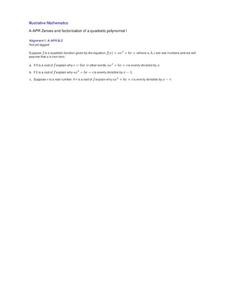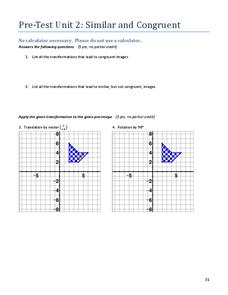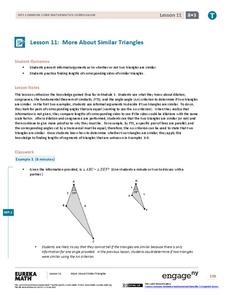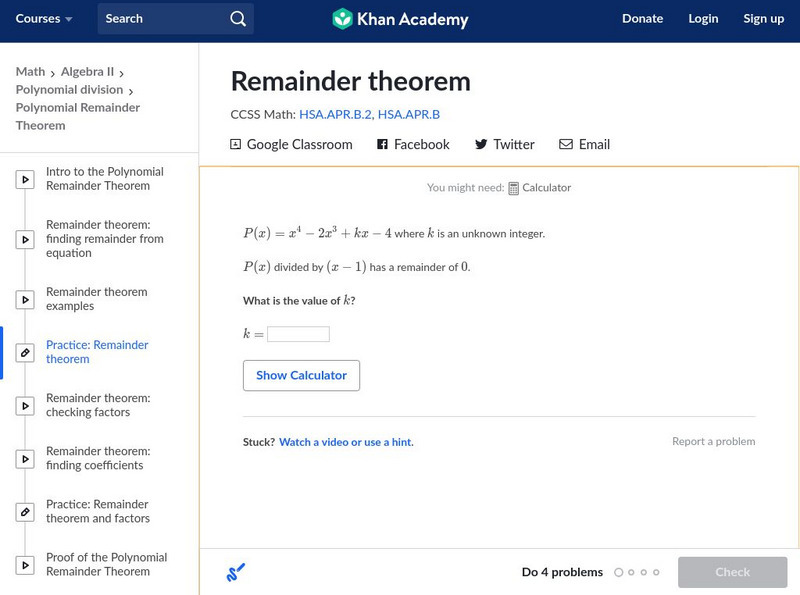EngageNY
Fundamental Theorem of Similarity (FTS)
How do dilated line segments relate? Lead the class in an activity to determine the relationship between line segments and their dilated images. In the fourth section in a unit of 16, pupils discover the dilated line...
Illustrative Mathematics
The Missing Coefficient
This activity highlights the use of the remainder theorem to solve for the unknown coefficient of a specified polynomial when given one of its factors. Use this single problem as a warm-up exercise, a quick check-in at the end of a...
Illustrative Mathematics
Zeroes and factorization of a quadratic polynomial I
This activity uses the division algorithm and the definition of a zero/root of a function to guide your class to see the relationship between zeros and factors of a general quadratic, which can later be generalized to the Remainder...
Inside Mathematics
Hopewell Geometry
The Hopewell people of the central Ohio Valley used right triangles in the construction of earthworks. Pupils use the Pythagorean Theorem to determine missing dimensions of right triangles used by the Hopewell people. The assessment task...
EngageNY
First Consequences of FTS
Challenge the young mathematicians to find the exact coordinates of a dilated point. The fifth segment in a 16-part series introduces the class to the converse of the Fundamental Theorem of Similarity. Scholars use the theorem to...
Mt. San Antonio Collage
Quiz 2: Polynomials
Four questions that get right to the polynomial point. High schoolers list all the attributes of a polynomial function, including finding all complex zeros. The last two questions prompt them to write a function based on the given...
EngageNY
Informal Proof of AA Criterion for Similarity
What does it take to show two triangles are similar? The 11th segment in a series of 16 introduces the AA Criterion for Similarity. A discussion provides an informal proof of the theorem. Exercises and problems require scholars to apply...
EngageNY
End-of-Module Assessment Task - Grade 8 Mathematics (Module 3)
Everything the class knows about similarity in one small package. The last portion of a 16-part series is a three-question assessment. In it, pupils demonstrate their application of similar figures and their associated...
EngageNY
Law of Cosines
Build upon the Pythagorean Theorem with the Law of Cosines. The 10th part of a 16-part series introduces the Law of Cosines. Class members use the the geometric representation of the Pythagorean Theorem to develop a proof of the Law of...
Mathematics Assessment Project
College and Career Readiness Mathematics Test C2
Scholars apply knowledge learned over their high school math courses in order to determine their college readiness. The 20-page resource emphasizes applied problem solving.
Charleston School District
Pre-Test Unit 2: Similar and Congruent
A pre-test contains questions about transformations that lead to congruent and similar images. It also covers angle relationships associated with triangles and parallel lines intersected by a transversal.
EngageNY
More About Similar Triangles
Determine whether two triangles are similar. The lesson presents opportunities for pupils to find the criterion needed to show that two triangles are similar. Scholars use the definition of similarity to find any missing side...
Mathematics Assessment Project
Arithmetic with Polynomials and Rational Expressions
It all starts with arithmetic. An educational resource provides four items to use in summative assessments. The items reflect the basic skill level required by the standards in the domain and are designed to have...
Mathematics Assessment Project
College and Career Readiness Mathematics Test B1
Math was easier before it got mixed up with the alphabet. A 10-page test covers material from multiple years of high school math. Scholars demonstrate knowledge across domains with a mixture of short answer and applied problems.
Mt. San Antonio Collage
Quiz 2: Types of Functions
Here is a resource that provides the structure of an assessment with the convenience of a full answer key. The focus is on rational, exponential, and logarithm functions with a few questions on solving polynomials.
EngageNY
Informal Proofs of Properties of Dilations
Challenge the class to prove that the dilation properties always hold. The lesson develops an informal proof of the properties of dilations through a discussion. Two of the proofs are verified with each class member performing the...
Varsity Tutors
Varsity Tutors: Hotmath: Polynomial Division: The Remainder and Factor Theorems
Thirty-nine problems present a variety of practice applying the remainder and factor theorems to polynomial division.
McGraw Hill
Glencoe Mathematics: Quiz on the Remainder and Factor Theorems
The online assessment demonstrates knowledge of advanced mathematical concepts in Algebra II. The questions test students on the remainder and factor theorems.
Khan Academy
Khan Academy: Algebra Ii: Remainder Theorem
Use the PRT (Polynomial Remainder Theorem) to determine the factors of polynomials and their remainders when divided by linear expressions. Students receive immediate feedback and have the opportunity to try questions repeatedly, watch a...
Math Notes and Math Tests
Pre Calculus Notes: Polynomial Functions of Higher Degree [Pdf]
The resource discusses polynomial functions of higher degree. Topics examined are infinity, limits, the factor theorem, and the intermediate value theorem.


















